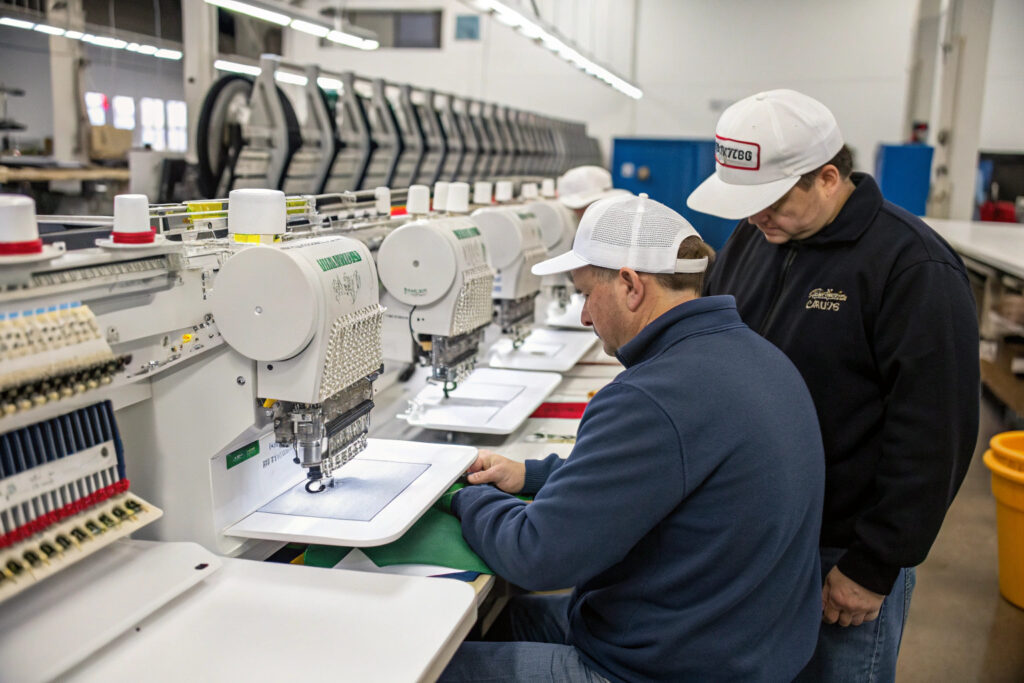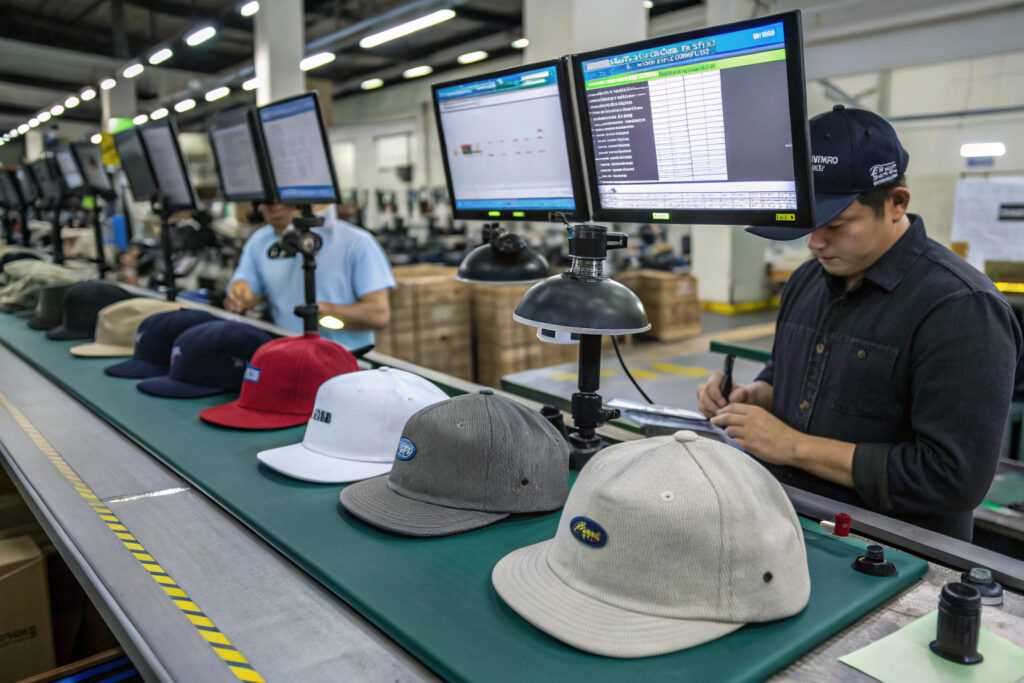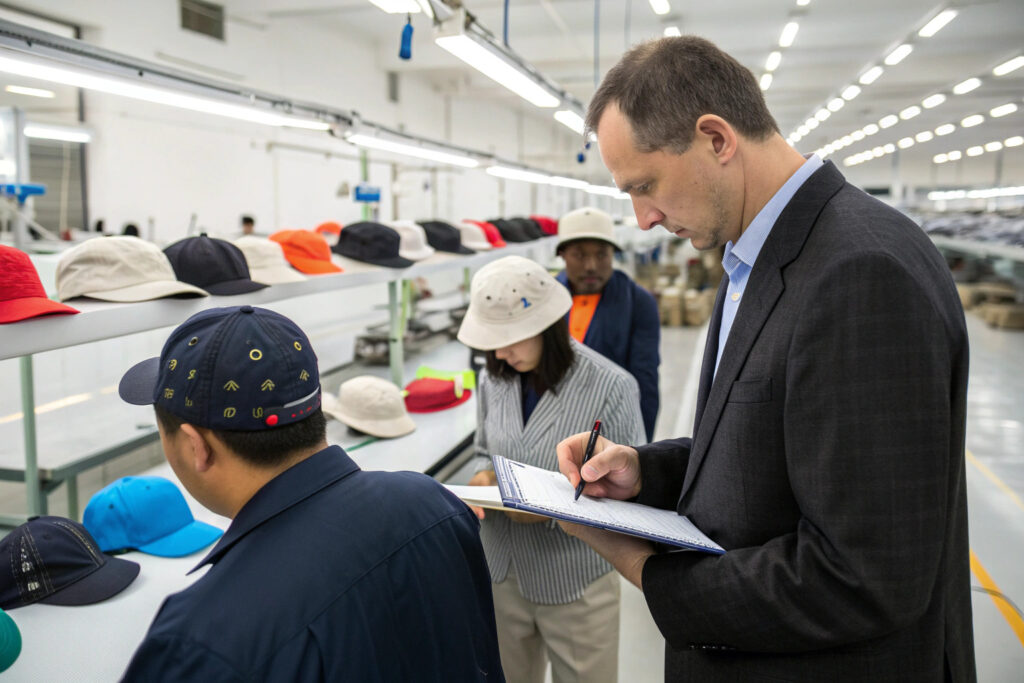Conducting a thorough factory audit before placing hat manufacturing orders can mean the difference between a successful partnership and costly production failures. Many brands discover quality issues, ethical concerns, or capacity limitations only after problems arise, when switching manufacturers becomes expensive and disruptive.
A comprehensive hat factory audit should evaluate manufacturing capabilities, quality control systems, ethical compliance, financial stability, and communication effectiveness. This due diligence process identifies potential risks and ensures your chosen partner can consistently deliver products that meet your specifications, timeline, and quality standards.
Proper factory auditing requires systematic assessment across multiple operational areas, combining document review, physical inspection, and personnel interviews to build a complete picture of manufacturing capabilities and reliability.
What Manufacturing Capabilities Should You Verify?
Understanding a factory's specific manufacturing capabilities ensures they possess the equipment, expertise, and capacity to produce your hat styles at the quality level you require. Many factories specialize in certain construction methods or materials while lacking others.
Key manufacturing areas to assess include equipment types and conditions, technical staff expertise, production capacity calculations, and material sourcing capabilities. Each element directly impacts the factory's ability to execute your designs properly.

How to Evaluate Specialized Equipment and Maintenance?
The condition, modernity, and maintenance of specialized hat-making equipment directly impacts production quality, efficiency, and consistency. Proper equipment assessment goes beyond simple inventory to evaluate operational condition and maintenance protocols.
Document the factory's equipment inventory including computerized embroidery machines, specialized sewing equipment, hat blocking machines, and cutting systems. Our audit checklist requires verification of preventive maintenance records, equipment calibration certificates, and spare parts inventory. Factories with documented TPM (Total Productive Maintenance) programs typically demonstrate 35% higher equipment efficiency and more consistent output quality. During physical inspection, note equipment age, cleanliness, and organization—factories maintaining their equipment to 5S standards generally produce more consistent quality. The most capable manufacturers invest in regular technology upgrades and can demonstrate how new equipment improves specific quality metrics.
What Production Capacity Metrics Matter Most?
Understanding true production capacity prevents overloading manufacturers and ensures they can meet your delivery timelines without compromising quality or requiring excessive overtime.
Calculate realistic daily output capacity by examining machine hours, staffing levels, and historical production data. Our capacity analysis evaluates throughput rates for different hat styles—structured baseball caps typically produce 150-300 units daily per production line, while beanies may reach 500-800 units. Verify order backlog status and capacity allocation to ensure your orders won't be deprioritized during peak seasons. The most transparent manufacturers provide access to their production planning systems and can demonstrate how they manage capacity buffers for unexpected orders or production issues. Factories operating at 85-90% capacity typically deliver the best balance of efficiency and flexibility.
How to Assess Quality Control Systems?
Robust quality control systems separate exceptional manufacturers from average ones. These systems should proactively prevent defects rather than simply detecting them after production.
Effective quality control assessment examines inspection protocols, testing equipment, defect tracking, and continuous improvement processes. Each element contributes to consistent output quality.

What Documentation Verifies Quality Management?
Quality management documentation provides objective evidence of systematic approaches to quality rather than ad hoc inspection practices. Comprehensive documentation demonstrates manufacturing maturity and consistency.
Request the factory's quality manual outlining their quality policy and organizational structure. Verify they maintain controlled documents including standard operating procedures, inspection instructions, and testing protocols. Our audit requires review of quality records such as inspection reports, test certificates, and corrective action reports. Manufacturers with ISO 9001 certification typically have more robust documentation systems, but certification alone doesn't guarantee implementation—verify that documented processes match actual practices. The most reliable partners maintain statistical process control charts tracking key quality metrics like stitch consistency and size accuracy.
How to Evaluate In-Process Quality Controls?
In-process quality controls catch defects during manufacturing when correction costs are lowest. These real-time checks prevent the accumulation of defective work through production stages.
Observe operator self-inspection practices where workers check their own output before passing to next工序. Verify implementation of successive check systems where each工序 inspects incoming work from previous stations. Our assessment includes timing how long defective products remain in production before identification—quick detection indicates effective process controls. The most advanced manufacturers use andon systems that alert supervisors to quality issues immediately. Evaluate their first article inspection process for new styles—comprehensive initial inspection prevents recurring defects throughout production runs. Factories with structured quality control stations at critical process points typically achieve 30% lower defect rates than those relying solely on final inspection.
Why Assess Ethical and Social Compliance?
Ethical manufacturing practices impact brand reputation, product quality, and supply chain stability. Factories with poor working conditions often experience high staff turnover, quality inconsistencies, and production delays.
Social compliance evaluation examines working conditions, compensation practices, environmental management, and business ethics. These factors directly and indirectly affect manufacturing reliability and product quality.

What Labor Practice Documentation Provides Assurance?
Comprehensive labor documentation demonstrates legal compliance and ethical employment practices that reduce operational risks and ensure workforce stability.
Review employment contracts verifying compliance with local minimum wage laws and working hour regulations. Examine payroll records and time cards for accuracy and compliance. Verify social insurance payments and benefit provisions meeting local requirements. Our audit includes checking for child labor compliance through age verification documents and young worker permits where applicable. Manufacturers with third-party social compliance certifications like WRAP or BSCI typically have more reliable documentation systems, though certificates alone don't guarantee ongoing compliance—verify through worker interviews and record examination.
How to Evaluate Workplace Health and Safety?
Safe working environments reduce accident-related disruptions while demonstrating management's commitment to employee wellbeing, which correlates with higher quality output.
Inspect machine guarding on all equipment, particularly sewing machines and cutting equipment. Verify availability and condition of personal protective equipment including hearing protection in high-noise areas. Check emergency preparedness through evacuation plans, fire extinguisher maintenance records, and first aid supplies. Our safety assessment includes reviewing accident records and corrective actions for past incidents—factories with proactive safety programs typically have declining incident rates. The most safety-conscious manufacturers conduct regular safety training and maintain safety committee minutes demonstrating ongoing attention to workplace hazards.
What Financial Stability Indicators Matter?
Financial stability assessment ensures your manufacturing partner can weather economic fluctuations and maintain operations throughout your production cycle without cash flow interruptions.
Key financial indicators include payment history, debt levels, profitability, and ownership structure. These factors impact the factory's ability to purchase materials, retain staff, and invest in quality improvements.

How to Assess Payment Reliability and Cash Flow?
Payment practices with suppliers and financial flexibility indicate whether a factory can maintain operations during economic pressures or unexpected challenges.
Request trade references from material suppliers verifying payment history and credit terms. Check bank references confirming account history and credit facilities. Our financial assessment includes analyzing financial statements for liquidity ratios and debt levels—factories with current ratios above 1.5 and debt-to-equity ratios below 60% typically demonstrate better financial health. Verify the factory's ability to purchase materials for your order without requiring excessive deposits—manufacturers requesting more than 30% deposit may have cash flow constraints. The most stable partners have diverse customer bases and aren't overly dependent on any single client or market segment.
What Ownership and Management Structure Provides Stability?
Ownership structure and management experience influence decision-making, long-term planning, and response to challenges. Understanding these elements helps assess partnership potential beyond transactional relationships.
Identify ownership structure—family-owned businesses, privately held corporations, or publicly traded companies—each with different strengths and challenges. Evaluate management team experience and average tenure—factories with stable leadership typically demonstrate more consistent quality and business practices. Our assessment includes reviewing business licenses, export permits, and manufacturing certifications verifying legal operation. Manufacturers with succession plans for key positions demonstrate forward thinking that benefits long-term partnerships. The most reliable partners have transparent ownership and can articulate clear business strategy beyond immediate production needs.
Conclusion
A comprehensive hat factory audit evaluates manufacturing capabilities, quality systems, ethical compliance, and financial stability to identify partners who can reliably produce quality products while maintaining ethical standards. This due diligence process prevents costly production issues, protects brand reputation, and establishes foundation for successful long-term partnerships.
The most effective audits combine document review, physical inspection, and personnel interviews to verify that stated capabilities match actual practices. Factories that welcome thorough audits typically demonstrate the transparency and systematic approaches that predict manufacturing success.
Ready to conduct a professional audit of our hat manufacturing facilities? Contact our Business Director Elaine today to schedule a comprehensive assessment of our capabilities, quality systems, and ethical compliance. Her email is elaine@fumaoclothing.com. We welcome thorough evaluation and demonstrate our commitment to manufacturing excellence through transparent operations and verifiable performance metrics.







